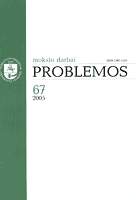DAIKTŲ IR VARDŲ SANTYKIO FILOSOFINĖ REFLEKSIJA ANTIKOJE
PHILOSOPHICAL REFLECTION ON THE RELATIONSHIP BETWEEN THINGS AND THEIR NAMES IN THE ANTIQUITY
Author(s): Nijole AukštuolyteSubject(s): Philosophy
Published by: Vilniaus Universiteto Leidykla
Keywords: epistemology; logos; language and knowledge; word and thing; Aristotle’s logic.
Summary/Abstract: The article discusses the Antique philosophical reflection of the relationship between being, knowing and language, based on the unity of being and thinking in the syncretic thinking of the Greek philosophers. Its most characteristic manifestation lies in the attempts of ancient philosophy to explain the nature and relationships of the world and to seek for true knowing, conceived as knowledge of ‘true things’, in other words, the names of the essence. The article argues that Plato’s search for the names of ‘true things’ implies a theoretical analysis of the adequacy of language for knowing as well as raises the objective of philosophical analysis of the cognitive potential of language. Plato’s ambiguous stance with reference to the potential of language to reveal the essence of things is also shown. Aristotle’s attempts to analyze knowing as a result of logical thinking and his attempts to search for more precise equivalents of thought in language led to the idea of the methodological approach which identifies language as knowing and focuses on the analysis of its potential to depict the world and penetrate into its nature.
Journal: Problemos
- Issue Year: 2005
- Issue No: 68
- Page Range: 51-62
- Page Count: 12
- Language: Lithuanian

